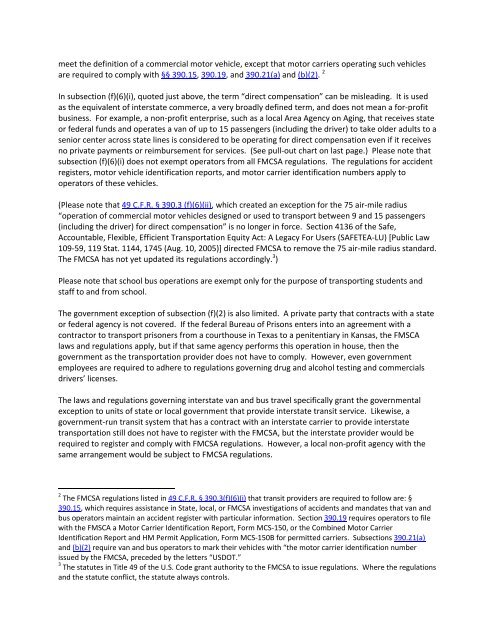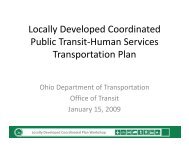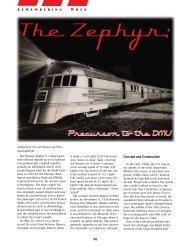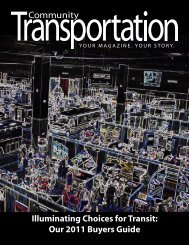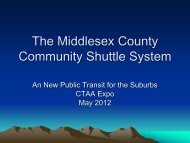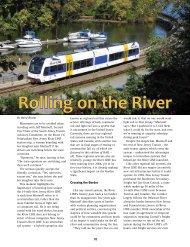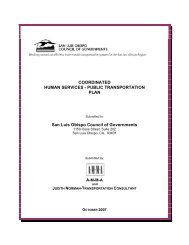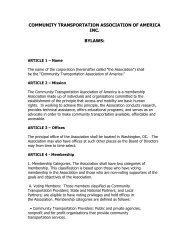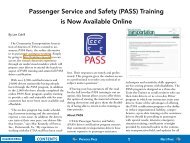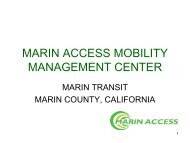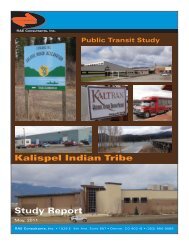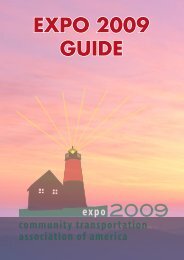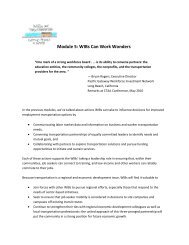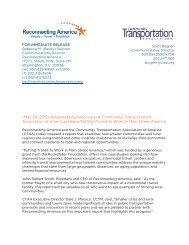FMCSA - The Community Transportation Association of America
FMCSA - The Community Transportation Association of America
FMCSA - The Community Transportation Association of America
You also want an ePaper? Increase the reach of your titles
YUMPU automatically turns print PDFs into web optimized ePapers that Google loves.
meet the definition <strong>of</strong> a commercial motor vehicle, except that motor carriers operating such vehiclesare required to comply with §§ 390.15, 390.19, and 390.21(a) and (b)(2). 2In subsection (f)(6)(i), quoted just above, the term “direct compensation” can be misleading. It is usedas the equivalent <strong>of</strong> interstate commerce, a very broadly defined term, and does not mean a for‐pr<strong>of</strong>itbusiness. For example, a non‐pr<strong>of</strong>it enterprise, such as a local Area Agency on Aging, that receives stateor federal funds and operates a van <strong>of</strong> up to 15 passengers (including the driver) to take older adults to asenior center across state lines is considered to be operating for direct compensation even if it receivesno private payments or reimbursement for services. (See pull‐out chart on last page.) Please note thatsubsection (f)(6)(i) does not exempt operators from all <strong>FMCSA</strong> regulations. <strong>The</strong> regulations for accidentregisters, motor vehicle identification reports, and motor carrier identification numbers apply tooperators <strong>of</strong> these vehicles.(Please note that 49 C.F.R. § 390.3 (f)(6)(ii), which created an exception for the 75 air‐mile radius“operation <strong>of</strong> commercial motor vehicles designed or used to transport between 9 and 15 passengers(including the driver) for direct compensation” is no longer in force. Section 4136 <strong>of</strong> the Safe,Accountable, Flexible, Efficient <strong>Transportation</strong> Equity Act: A Legacy For Users (SAFETEA‐LU) [Public Law109‐59, 119 Stat. 1144, 1745 (Aug. 10, 2005)] directed <strong>FMCSA</strong> to remove the 75 air‐mile radius standard.<strong>The</strong> <strong>FMCSA</strong> has not yet updated its regulations accordingly. 3 )Please note that school bus operations are exempt only for the purpose <strong>of</strong> transporting students andstaff to and from school.<strong>The</strong> government exception <strong>of</strong> subsection (f)(2) is also limited. A private party that contracts with a stateor federal agency is not covered. If the federal Bureau <strong>of</strong> Prisons enters into an agreement with acontractor to transport prisoners from a courthouse in Texas to a penitentiary in Kansas, the FMSCAlaws and regulations apply, but if that same agency performs this operation in house, then thegovernment as the transportation provider does not have to comply. However, even governmentemployees are required to adhere to regulations governing drug and alcohol testing and commercialsdrivers’ licenses.<strong>The</strong> laws and regulations governing interstate van and bus travel specifically grant the governmentalexception to units <strong>of</strong> state or local government that provide interstate transit service. Likewise, agovernment‐run transit system that has a contract with an interstate carrier to provide interstatetransportation still does not have to register with the <strong>FMCSA</strong>, but the interstate provider would berequired to register and comply with <strong>FMCSA</strong> regulations. However, a local non‐pr<strong>of</strong>it agency with thesame arrangement would be subject to <strong>FMCSA</strong> regulations.2 <strong>The</strong> <strong>FMCSA</strong> regulations listed in 49 C.F.R. § 390.3(f)(6)(i) that transit providers are required to follow are: §390.15, which requires assistance in State, local, or <strong>FMCSA</strong> investigations <strong>of</strong> accidents and mandates that van andbus operators maintain an accident register with particular information. Section 390.19 requires operators to filewith the FMSCA a Motor Carrier Identification Report, Form MCS‐150, or the Combined Motor CarrierIdentification Report and HM Permit Application, Form MCS‐150B for permitted carriers. Subsections 390.21(a)and (b)(2) require van and bus operators to mark their vehicles with “the motor carrier identification numberissued by the <strong>FMCSA</strong>, preceded by the letters “USDOT.”3 <strong>The</strong> statutes in Title 49 <strong>of</strong> the U.S. Code grant authority to the <strong>FMCSA</strong> to issue regulations. Where the regulationsand the statute conflict, the statute always controls.


